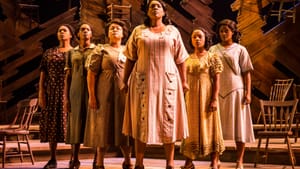Stay in the Loop
BSR publishes on a weekly schedule, with an email newsletter every Wednesday and Thursday morning. There’s no paywall, and subscribing is always free.
Finding your voice
Kimmel Center's Broadway Philadelphia presents 'The Color Purple'

When I first saw John Doyle’s revival of the musical adaptation of The Color Purple on Broadway in 2016, I marveled at how completely his vision changed my perspective on the piece. Doyle’s minimalist concept strips away the empty pageantry that defined the original production, smartly refocusing on one abused, unloved woman’s journey to self-actualization. After a successful two-year New York run, its national tour visits the Kimmel Center's Broadway Philadelphia series with almost none of its power or poignancy diminished.
Finding strength
Based on Alice Walker’s Pulitzer-Prize-winning novel, The Color Purple tells the story of Celie (Adrianna Hicks), a kindhearted woman who endures more adversity than anyone should withstand. After bearing two of her stepfather’s children before her 14th birthday, she finds herself unceremoniously married to Mister (Gavin Gregory), a violent older man who cares little for her feelings or desires. After Celie’s beloved sister Nettie (N’Jameh Camara, in a moving performance) rebukes Mister’s sexual advances, he separates them, ultimately convincing Celie that Nettie is dead.
Celie finds comfort, and ultimately strength, through her relationships with two secure, self-possessed women. Sofia (sensational Carrie Compere), the wife of Mister’s son Harpo (J. Daughtry, funny and memorable), shows Celie that a woman need not subjugate herself to a man. Shug Avery (Carla R. Stewart, perhaps a tad too wounded), a blues singer and Mister’s sometime girlfriend, introduces Celie to earthly pleasures. Their intimate friendship opens Celie’s eyes to possibilities beyond her depressing, terror-filled life for the first time.
Doyle — who also designed the bare-bones, distressed-wood set — foregrounds character development, with superb results. In Marsha Norman’s libretto, Celie remains meek and retiring throughout the first act. In the hands of an imprecise director, it would be easy for her to get lost amid the shuffle of more outwardly buoyant figures like Shug and Sofia.
But Doyle shows us how Celie constantly grows in confidence, even while she remains under her husband’s restrictive thumb. Hicks’s well-judged, beautifully sung performance complements this concept. She is believable through every step of Celie’s self-discovery.
The roots of abuse
The production also dares to make Mister a more sympathetic figure than I’ve ever seen. This might seem a questionable strategy; why should we feel anything approaching compassion for a man who systemically abuses his wife and children? Doyle conceives the character as a victim of abuse himself, at the hands of his domineering, belittling father. Abuse is learned behavior, after all.
Gregory plays this backstory effectively, visibly shrinking when Ol’ Mister (C.E. Smith) enters the room. For the first time, I believed Mister was truly affected by Celie’s curse that “until you do right by me, everything you think about is going to crumble.” His ultimate transformation from unrepentant abuser to genuinely remorseful penitent feels genuine.
Unfortunately, Doyle cannot change the writers’ decision to minimize the carnal nature of Celie and Shug’s relationship. In her novel, Walker links Celie’s personal and spiritual growth to sexual awakening. “Us kiss and kiss till us can’t hardly kiss no more,” Walker’s Celie says of their first assignation. “Then us touch all over. Then I feels something real soft and wet on my breast, something that feels like my little lost baby’s mouth.”
The musical elides this almost entirely. Celie and Shug share a short, chaste kiss, which is followed by the lovely but elliptical duet “What About Love?” Although they say they love each other, Norman and songwriters Brenda Russell, Allee Willis, and Stephen Bray present this as friendly or sisterly love, rather than a romantic partnership. This decision feels like a cop-out, or a concession to more conservative audience members who may not want to confront a lesbian love story within the context of a feel-good musical.
It’s a regrettable choice. Celie’s sexual blossoming should be part of her overall journey from scared girl to strong woman. Nonetheless, at this point in history where black women in the United States are reclaiming their time and refusing to be silenced, The Color Purple feels more relevant than ever.
What, When, Where
The Color Purple. By Marsha Norman, Brenda Russell, Allee Willis, and Stephen Bray. Based on the novel by Alice Walker. John Doyle directed. Through December 17, 2017, at the Forrest Theatre, 1114 Walnut Street, Philadelphia. (800) 872-8997 or telecharge.com.
Sign up for our newsletter
All of the week's new articles, all in one place. Sign up for the free weekly BSR newsletters, and don't miss a conversation.

 Cameron Kelsall
Cameron Kelsall